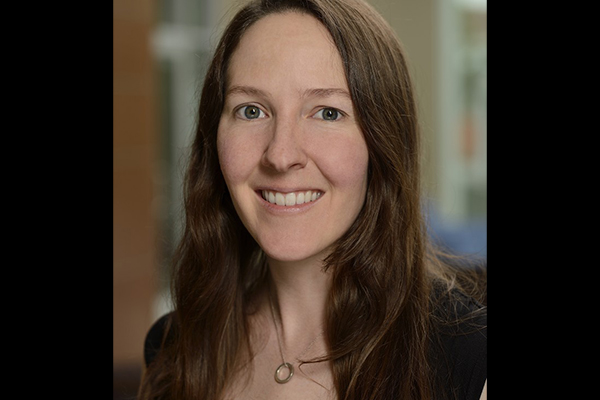Meet Alexis Battle, assistant professor of BME

Alexis Battle joined the Johns Hopkins Department of Biomedical Engineering as an assistant professor in December 2017, becoming the first faculty hire under Director Michael I. Miller’s BME 2.0 initiative. Battle is breaking new ground in computational genomics and machine learning, with recent back-to-back publications in the October 11, 2017 issue of Nature.
A core member of the National Institutes of Health’s Genotype-Tissue Expression (GTEx) consortium, Battle builds computational models to understand the impact of genetic differences on gene regulation—how and when proteins are made in the cell—across tissues or under different environmental conditions. In particular, her research focuses on predicting the effects of variation in noncoding DNA sequences—the 98 percent of the genome that does not carry instructions to produce proteins—since the function of these regions is still relatively unknown. Ultimately, Battle hopes to understand how these changes in DNA sequence affect both normal human tissue and disease, opening the door for new advances in personalized medicine based on a patient’s genomic information.
In this interview, Battle discusses her experiences as a Google employee, as a researcher at Johns Hopkins, and as a mentor.
You worked at Google for a few years after graduating from college. What inspired you to go back to school and pursue a career in academia?
When I was finishing my undergraduate degree, I knew that I would go on to grad school, but I wanted to take a year to gain some real-world experience and see what it’s like working in industry. Google turned out to be much more fun and engaging than I expected, so I ended up staying there longer than I planned. Going back to grad school was always the plan. It was just delayed.
How has working for Google shaped your current work?
I was a manager at Google for a while, and that experience influenced how I interact with my students and how I manage projects. Working for Google also gave me the opportunity to work with large-scale data. I think there are a lot of parallels between computational biology and the kind of work I was doing at Google. Biological data is not something that a human can simply look at and interpret. You need computational methods to find the patterns. Thinking about approaches to understand and visualize large sets of data at Google was great experience for the type of work I do now in genomics and computational biology.
You mentioned your role as a manager. What do you enjoy most about mentoring students?
There are two things I really enjoy. I find it much more fun to think about ideas when I am with other people, bouncing ideas back and forth and hearing different perspectives. Students come from all different backgrounds and bring diverse perspectives to the lab, which I find really engaging. It’s also incredibly rewarding to watch my students progress from brand-new students to mature researchers with their own ideas.
Have you ever experienced a “eureka” moment?
As a data scientist, I tend to look at aggregate trends rather than the details of individual genes or pathways, but I’ve had a few moments when I’ve been surprised by my results. Sometimes it’s surprising to see that the methods we’re applying actually allow us to predict the effects of rare variants. When we ran our big RNA sequencing study when I was a PhD student, I was surprised to see that regulatory variation is so pervasive and that we could detect reliable signals from nearly every gene in the genome. The first time I saw that result, I went back to [our previous] studies to make sure I really believed the data. Those types of moments are exciting.
Do you have any advice for students looking to follow in your footsteps?
What I do now is something that didn’t really exist when I was an undergraduate student, so there was no specific major or perfect path for me to follow to prepare for this career. New fields and subfields are emerging and changing at a rapid pace, so I would recommend that students take a lot of fundamental classes that interest them, but not limit themselves to one specific career path. Be open to new possibilities and the exciting directions in which science is heading now. Learn the fundamental tools that interest you, but always be thinking about the new applications and types of data that are becoming available.
What does the future of engineering look like?
Some of it is already happening—data is becoming increasingly important, and the need for automated analysis and interpretation of large datasets will touch every aspect of engineering. It’s interesting to watch the interplay between industry and academia, and I think that will continue to grow in the future. Some of the most advanced, difficult problems are starting to make their way into industry in exciting ways, so I think the feedback between industry, academia, and the clinic will become important to solve these types of open-ended questions going forward.
